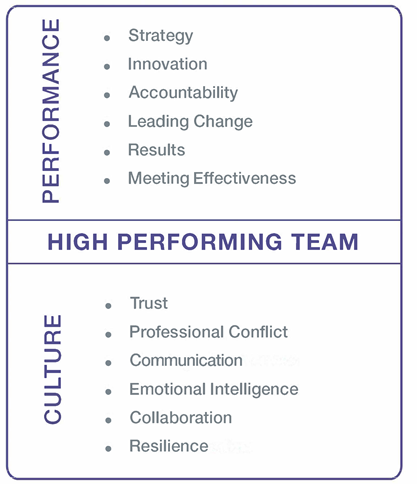Our solutions cover the entire employee lifecycle from selection through to development, focusing on individuals, teams and organisational solutions.
Building High Performing Teams - Part 2

Authored by: Dr Lynne Cruickshank, Senior Consultant, PBC
Teams play a valuable role in organisations and when seeking to establish a high performing team, one factor that should be taken into consideration is personality. Research recently conducted by PBC found that various aspects of personality were associated with team performance measured by the High Performing Team Assessment (HPTA), with the key highlights and implications summarised below.
To read the first part of our research, please read Part 1.

The HPTA Model
Results
Without a focus on delivering results consistently and to a high standard, teams are at risk of being inefficient and ineffective. Supporting teams in defining what success and effectiveness look like in terms of results is a critical part of understanding their level of current and potential performance (Pina, Martinez, & Martinez, 2008).
Teams that place a higher value on helping others and who are inclined to display higher levels of social sensitivity and tact were found to perform higher in relation to results. This included a tendency to seek consensus when under pressure and being conforming, compliant and eager to please others. These findings suggest that teams wishing to enhance their performance in relation to results should consider how they can work in a more cooperative and collegial manner including during periods when they are under pressure.
Interestingly and counter-intuitively, teams that valued data-based analysis and problem solving were found to perform more poorly in relation to results. This may be due to these teams placing a greater focus on analysis over action. These teams may need to ensure that their preference for analysis doesn’t prevent them from taking timely action to achieve their key goals and objectives.
Meeting Effectiveness
Teams that run meetings efficiently and purposefully are more likely to better manage the time they spend together. In the current research, teams with higher levels of emotional stability, a preference for social interaction, and social sensitivity were more likely to rate themselves as effective in terms of meeting effectiveness. However, teams that were more likely to manage pressure by distancing themselves from others and being prone to emotional outbursts, being cynical, argumentative and passive aggressive were likely to perform more poorly in relation to meeting effectiveness. This suggests that teams may be able to improve their performance in relation to meeting effectiveness by engaging with other team members more readily, learning to express their emotions more appropriately and adopting a more tactful approach when interacting with others.
Interestingly, having a strong preference for consistency and predictability and wanting to minimise risks also appears to have a negative effect on a team’s performance in relation to meeting effectiveness. Teams may benefit from considering how they can bring more variety to meetings (e.g. the approach used to discuss issues) and how they can be more adventurous when exploring ideas and identifying solutions. Teams should also consider putting protocols in place during meetings to ensure ideas are not quickly dismissed or criticised to encourage open discussion.
Communication
The quality of team communication is an essential component that directly impacts on team members’ experience of a team (Buljac-Samardzic, Dekker-van Doorn, van Wijngaarden, & van Wijk, 2010). The current research found that teams with a strong preference for interacting with others who share the same values and beliefs tend to perform more poorly in the area of communication. This suggests that teams may benefit from developing strategies that will help them to embrace the different perspectives and viewpoints within their team to enhance their communication.
Emotional Intelligence
Team members’ individual levels of emotional intelligence are likely to impact on how well they are able to navigate emotional situations that will inevitably arise throughout the life cycle of a team. How teams collectively approach emotional matters also provides either a supportive or discouraging culture around the management of emotions.
A tendency to be cynical, argumentative and fault-finding when under pressure was found to be negatively related to a team’s performance in relation to emotional intelligence. These teams may tend to be more critical when providing feedback to others and have difficulty developing trusting relationships with each other. These teams should consider strategies to develop more trusting relationships including through building more open communication and learning to suspend their judgement of others. They should also consider how they can be less critical when providing feedback and show more sensitivity when communicating with others.
Resilience
The resilience of a team is a critical factor in whether they are likely to negotiate complexity and challenges effectively. Cultivating team resilience is critical in ensuring teams have the ability and energy to build connections and strive to achieve success (Carmeli, Friedman, & Tishler, 2013). Unsurprisingly, resilience was found to be related to the team’s overall level of emotional stability. Teams with a tendency to be more calm, composed and even-tempered were more likely to be perceived as resilient while teams that were more likely to lose control of their emotions and be overly cynical and sceptical under pressure were found to have lower ratings of resilience.
Teams should consider how they can build their resilience so they can manage their emotions more effectively during their interactions with one another. This should include learning how to constructively express their emotions when they disagree or have differences of opinion with other team members. To build resilience, team members should also practice suspending their judgement and avoid quickly jumping to negative conclusions.
Overall, this research highlighted the value in understanding the personality composition of a team as it is likely to provide insight into areas where teams have strengths that they can leverage to be a high performing team as well as their potential areas for development. It is beneficial to not only know the day-to-day personality characteristics of the team but also their personality-based derailers, values and motivators as all of these factors were found to be related to the performance of high performing teams.
To find out more about the High Performing Team Assessment (HPTA), click here.
Latest posts
-
Apr 23, 2024
Workplace Competition: Why We Compete at Work
-
Apr 08, 2024
PBC and Hogan Update the Hogan 360 Assessment
-
Apr 03, 2024
Getting Assessment Advice from ChatGPT
Resources
Tap into our extensive collection of research, sample reports, case studies and thought leadership.
How can we help?
Contact us to discuss your requirements.
